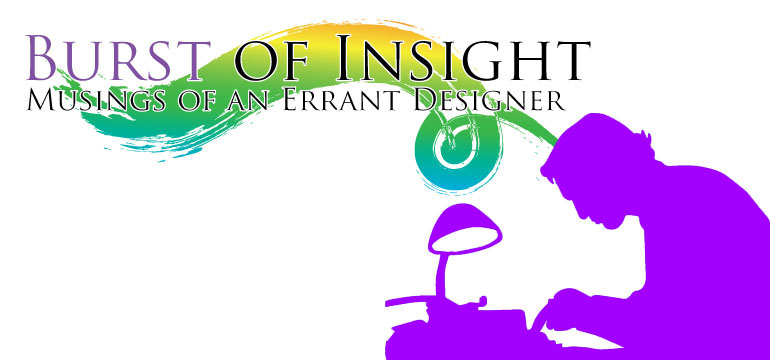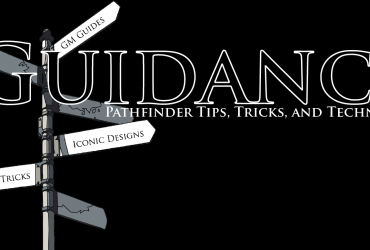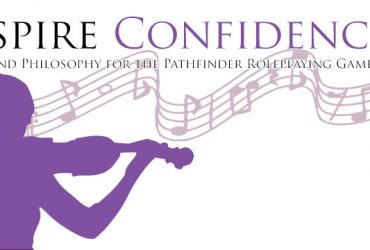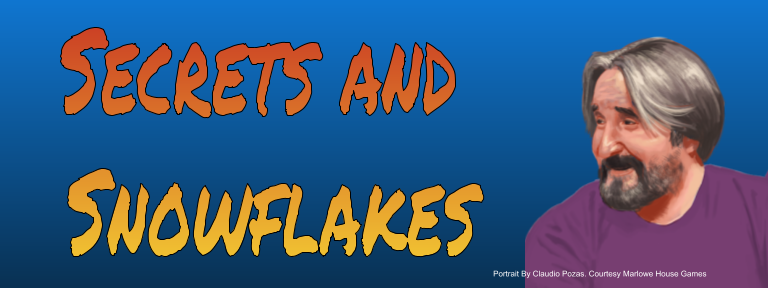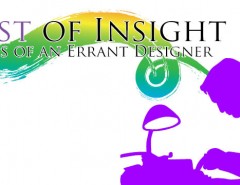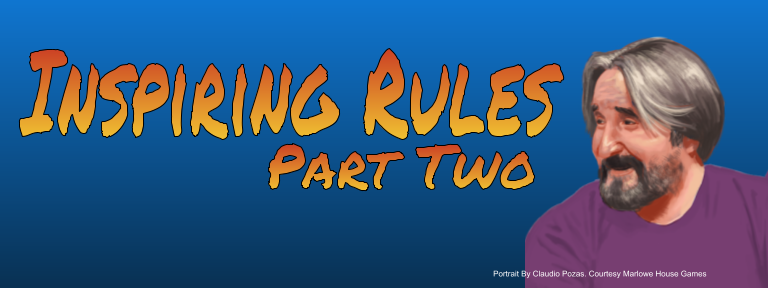Unless you were living under a rock, you probably know that this past weekend was Gen Con. The Fastest Four Days in Gaming or something like that. This year was the first time we took the entirety of Marlowe House for the entire convention. As a result, we did a little less of freelancer stuff we normally do and a little more gaming than we normally do.
One highlight for me was getting to finally try out Fantasy Flight’s take on the Star Wars Universe. The rule system is pretty narrative and for an industry built partly on weird dice it is worth noting until you’ve played a session (or likely read a rulebook) the dice the new Star Wars system uses are particularly weird. Turns out the die color and size (number of sides) of the die is important to the system as difficulties are increased and deceased by add or subtracting specific dice.
Of greatest interest to me however was the push-pull mechanic of the living force. At the beginning of the session everyone rolled a special d12 with 1 or 2 light or dark pips per side. Each player’s roll determined the number of double-sided force tokens the GM kept in front of him and which side was flipped up. (For our game the Darkside was almost overpoweringly strong.) These tokens could be flipped by either the GM or the players to affect the difficulty of a task flipping a token from light to dark gave the PCs an immediate advantage but gave the forces of darkness the ability to cause trouble against us later.
Why do I bring this up on a Pathfinder blog? Because I think we could adapt something like this to Pathfinder. Probably as another alternative to hero points.
For tokens at your table, if you have a copy of Othello you could break it out and place down one or two playing pieces per player and have them roll a die: Even, flips the piece to reflect the player’s advantage and odd to the adversaries’ advantage. If you don’t own a copy of Othello you could glue two cheap poker chips together or use quarters (“head’s” favor’s the PC’s, “tail’s” the enemy). So long as it’s clear enough to see which side is showing and easy to flip over. When you or a member of your party would normally spend a hero point you instead flip a PC Advantage token over to your adversaries’ advantage and the GM can do the same in reverse.
You could even use Harrow cards which might add a further element if you wanted to tie particular effects to certain cards. Which would mean not every game would have the same advantages available to play. Which is a compelling idea when you consider the upcoming re-release of Curse of the Crimson Throne.
So let’s say PC’s can turn a card to face the GM in order to gain a 1d8 bonus to any d20 roll or use one of the following benefits based on the cards each player has drawn instead. The GM can do the same to align the card to face the players. This system lacks the elegance of just using the tokens as interchangable hero points but it will have a distinctly Pathfinder flavor.
Example Card Effects:
The Paladin (LG STR): When you turn this card you gain a +8 to your CMD for 1 round.
The Dance (LG DEX): When you turn this card you gain a +4 dodge bonus to AC for one round.
The Trumpet (LG CON): When you turn this card you may take an extra action.
The Hidden Truth (LG INT): You gain a +8 to a Perception check or a Will save versus a single illusion.
The Winged Serpent (LG WIS): You may turn this card to give each PC (or all enemies DM) a bonus on their initiative check equal to their Wisdom bonus.
The Empty Throne (LG CHA): Reroll any failed d20 check when you turn this card.
The Keep (NG STR): When you turn this card each PC may roll 2d20 and take the best result when making will saves vs. fear this round.
The Cricket (NG DEX): When you turn this card you may add 10 to your speed this turn.
The Survivor (NG CON): If your hit points are reduced below 0 you may turn this card to automatically stabilize and regain 1d8 hp to a maximum of 0 hp. If this brings you back above negative con you manage to survive but suffer two negative levels as if you were the target of a raise dead spell.
The Wanderer (NG INT): When you turn this card you gain a +8 to a single Appraise check or a Perception check made to search.
The Midwife (NG WIS): When you turn this card you may roll 2d20 on any Perception, Knowledge, or Gather Information Check and take the best.
The Theater (NG CHA): When you turn this card you may increase the caster level of any divination spell you cast by +2.
The Big Sky (CG STR): You gain a +8 to Escape Artist Checks, Will saves, or Reflex saves to escape physical or mental bondage.
The Juggler (CG DEX): When you turn this card you may reroll any d20 check and take the best result.
The Desert (CG CON): When you turn this card you may increase the caster level of any conjuration spell you cast by +2.
The Joke (CG INT): When you turn this card you may increase the caster level of any transmutation spell you cast by +2.
The Publican (CG WIS): When you turn this card you and your allies each regain an additional hp per level when you rest for the night as a group.
The Unicorn (CG CHA): When you turn this card you gain a +8 to a single Appraise check or a Perception check made to search.
The Forge (LN STR): When you turn this card every successful aid another action made to help you this round grants you a +4 rather than the usual +2.
The Locksmith (LN DEX): When you turn this card you gain a +8 to a Disable Device check you make this round.
The Brass Dwarf (LN CON): When you turn this card you gain DR 2/ magic against the next attack that hits you this round.
The Bear (N STR): When you turn this card you deal an additional +2 points of damage with a single melee attack or a +2 on a Strength check made to lift or carry this round.
The Owl (N WIS): When you turn this card you gain a +8 to a Knowledge (nature) or Survival check you make this round.
The Twin (N CHA): You may emulate any teamwork feat that you meet the requirements for so long as an ally who possess the same feat is within 30 feet of you.
The Vision (CN INT): When you turn this card you can recall a spell you have already cast or to gain another use of a special ability that is otherwise limited. This should only be used on spells and abilities possessed by your character that recharge on a daily basis.
The Carnival (CN WIS): When you turn this card you may increase the caster level of an Illusion spell you cast by +2.
The Rakshasa (LE INT) You gain a +8 to Escape Artist Checks, Will saves, or Reflex saves to escape physical or mental bondage.
The Eclipse (LE WIS): When you turn this card you may increase the caster level of an evocation spell you cast by +2.
The Beating (NE STR): When you turn this card you may inflict an additional 1d6 points of precision damage on each successful hit you make this round.
The Crows (NE DEX): When you turn this card you may gain a +8 to a single Stealth check.
The Sickness (NE CON): When you turn this card you gain a +4 to a single Fortitude save and all of your allies gain a +2 bonus to any Fortitude saves until the end of the round.
The Idiot (NE INT): When you turn this card you gain a +8 to a single Bluff or Diplomacy check you make this round.
The Mute Hag (NE WIS): When you turn this card you may increase the caster level of an enchantment spell you cast by +2.
The Demon’s Lantern (CE DEX): If you feel stuck at one point in the adventure, you can turn this card and petition the GM for a hint about what to do next. If the GM feels that there is no information to be gained, the card is not turned.
The Waxworks (CE CON): When you turn this card you may increase the caster level of any transmutation spell you cast by +2.
The Snakebite (CE INT): When you turn this card you may attempt a single Knowledge check untrained or gain a +4 bonus to a Knowledge you do possess.
The Liar (CE CHA): When you turn this card you may roll 2d20 on any Bluff or Sense Motive checks you make this round.
(I may have gotten a little carried away with my example list if I’d had a little more time I probably could have finished it.)
Just remember if you are looking for ways to freshen up your Pathfinder game don’t be afraid to look to other systems to inspire your design. We found something interesting in Fantasy Flight’s Star Wars system who knows what you’ll find if you go looking.

